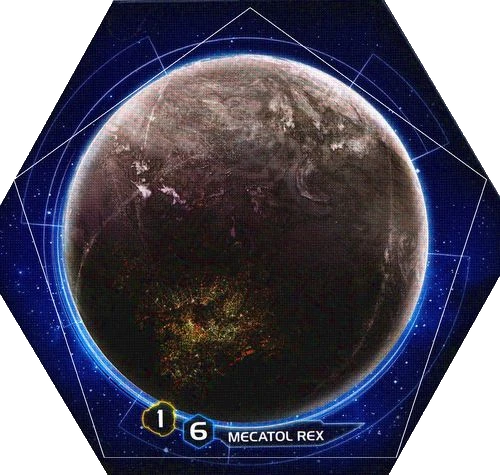
Mecatol Rex.
A blasted hellscape, scarred and pitted, haunted by the ghosts of ancient custodians who await the next fools to aspire for lordship over its husk-corpse. A million billion xenos of species innumerable have spilled synth-blood and soul across flagstones that have witnessed aeons of death, sacrificed at the altar of failed ambition.
Mecatol Rex.
The hollowed-out heart of the galaxy. The Hungering Throne, whose call reaches like siren-song across the cosmos, pulling at the threads of the greatest individuals the galaxy has ever seen, turning them from fruitful destiny to bloodied victims. It would be the height of folly to try wrench control of it for yourself, and require a disregard verging on manic recklessness for the numberless skulls lining the path to ascension.
Mecatol Rex.
It's rightfully mine.
I.
I don't wanna live forever, uh
Shoot, punch, loot corpse, I ain't tryna live forever
Yeah
New gear, same stats, I ain't tryna live forever
Last year, I was invited by my now co-founder Stephen Deutsch to take a vaunted spot at his yearly Twilight Imperium IV game. It takes thirteen hours to play. Children and partners are banished from abodes. Spotify playlists are constructed, featuring what I can only describe as a distressing array of sonic warfare, appealing to neurodivergents of all ages. Factions and starting positions are drafted weeks in advance, with things being competitive enough that there's even a ban phase to eliminate species that will interfere with your game plan. Alcohol flows freely as would-be contenders for the ancient throne of Mecatol Rex vie for power.
They have assembled a horrific, glass-and-faux-gold trophy. In the process, they have somehow misspelled MECATOL as METACOL, which has miraculously only increased its value. Sticky notes fly from it like the pennants of victorious warlords, resplendent with the winner's name, year of victory, and faction. It is truly hideous, and it is accordingly our fondest desire that our partners must resignedly accept that the winner is going to display it as prominently as possible in the living room.
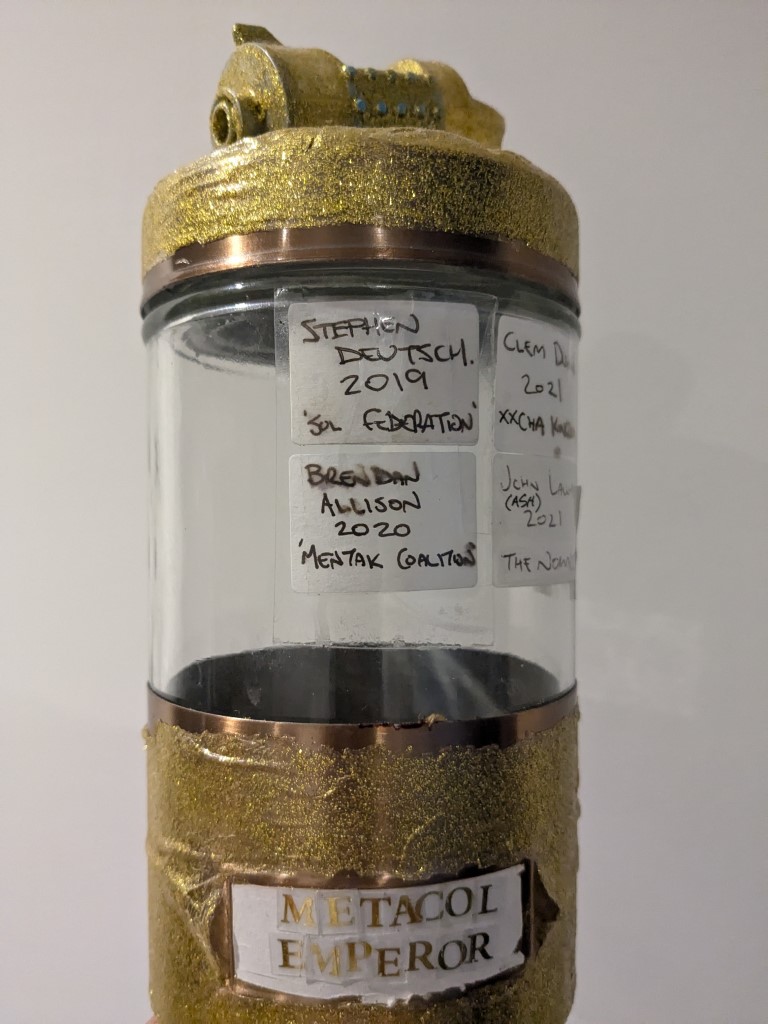
It is, of course, a long shot. I have never played the game, and the ruleset for a game that takes thirteen hours is hardly going to be easy to learn. Napkin math looking at the number of winners listed on the trophy reveals that the other players brought at least 260 hours of collective experience at the table. There are hundreds of cards that generate game-changing events, win conditions, factions, and to top it all off, a randomly generated board. Small mistakes in the first hour can ripple throughout the rest of the game and make victory impossible, consigning you to a miserable year long wait before the next attempt. Despite the reality of that, I had a good time.
Just kidding, I won, you absolute bastards, you should have known better than to bring someone that grew up in Asia to the table! You stupid idiots! This isn't a post-mortem, this is a supervillain monologue. For decades my machinations lay undetected, and now you sordid sons of bitches are dead and I am the fucking emperor of space! Ahahahahahahahah—
II. Background
The game takes place on a big map of the galaxy, at the center of which lies the legendary Mecatol Rex, perhaps the most radical name in board game history, the seat of the space emperor's glorious throne. It is currently managed by the custodians, an alien race that is waiting to see which faction is the most worthy to rule. The goal of the game is to accomplish objectives which impress upon the imperial custodians that your faction is the most worthy. Whoever reaches ten points first gets the throne.
The Players and Factions
Everyone at the table has the ephemeral quality that all my readers call "getting it". It's whatever you need in your head to communicate effectively and not assert that all your issues are the result of not being "Agile enough", whatever the fuck that means. It also happens to be the thing you need to initiate the effective delivery of board game violence. Two of them are now directors at my consultancy. Everyone at the table was highly qualified in either technology or law, with the exception of Brendan, who is nonetheless the formidable avatar-made-mortal of high-functioning ADHD, and came closest to stealing my throne.
- Stephen (The Nomad): The Nomad is a time traveler, who gets huge piles of money and can reposition his gigantic capital ship, presumably because he knows where every fight is going to happen and can manipulate the stock market.
- Brendan (Argent Flight): The Argent Flight are a bunch of birds on a holy crusade. Typing that sentence made me realize that I am never going to be a mature adult. All their powers are based on political zeal and shooting down starfighters.
- David (The Winnu): David is playing as a bunch of sad exiled custodians, who seem to be universally regarded as the worst faction in the game. Their abilities are centered around making David stare at a board sadly for thirteen hours while his friends have fun.
- Ash (The Barony of Letnev): The Barony produces tremendous volumes of slightly inferior spacecraft. Their flavour text reads "Our armada will blot out the sun—when they die, they will die in darkness!"
- Clem (Federation of Sol): The Federation of Sol are one of the strongest factions in the game, and are literally just humans doing a re-enactment of Starship Troopers. They throw infantry at you until you die.
- Me (Titans of Ul): The Titans of Ul are a species of thousand-feet tall giants with a focus on exploration, terraforming, and gigantic space cannons (for self-defense). They have no physical or moral weaknesses, as per the Emperor's Declaration of 2023, following their glorious ascension to the throne. If you have any critiques of the Titans, please report to your local Mind Reforming office for immediate reprogramming.
At the time of drafting, I had no idea what factions were good, and I picked the Titans of Ul with the sophisticated strategy of wanting giant robots. A quick glance over their abilities made them seem weird as well, and this was my fundamental strategy at this early juncture: against a table of people with far more experience, I should aim for asymmetry because an even playing field would probably result in losing. If the default is losing, I want as much variance as possible. You only get the trophy for first place, so losing extra hard did not bother me.
III. Slice Selection
The board is centered around Mecatol, and once you have selected your factions, you select the section of the galaxy that you start from. In a multiplayer game with a free-for-all setup, a great deal of the balancing is accomplished by players periodically teaming up against whoever is furthest ahead. Many game designers get lazy and let chaos handle the balancing, which makes playing well feel like a waste of time. Not so for Twilight Imperium IV. Placing yourself in a position that maximizes your chances of executing your game plan without interruption is probably the largest determinant of success. This is doubly true in systems where intervention is not possible from players in certain board states. In something like Magic: The Gathering, it's usually pretty easy to attack any player you want at any time, especially if not attacking means you're going to lose anyway. In Twilight Imperium IV, you might find yourself unable to attack someone that you really want to due being physically incapable of reaching them.
All I knew from the draft chatter was that Stephen and Clem were considered to have the strongest faction picks. Yet this is the layout we ended up with.
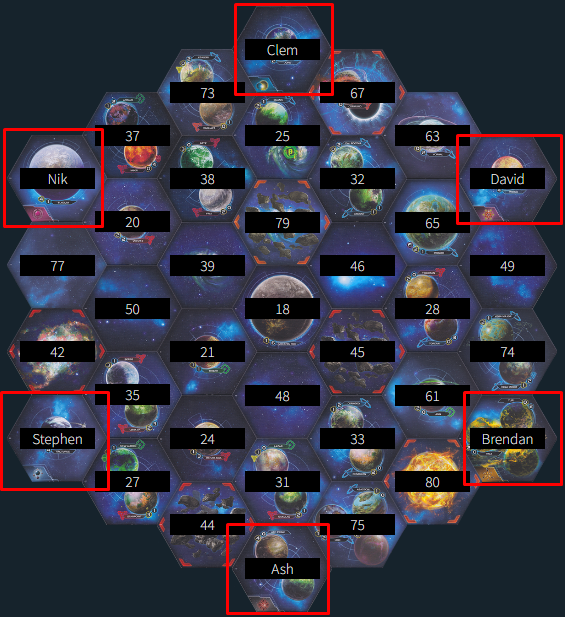
You will see me1 sandwiched between the two strongest players.
As strange as it might sound, this is an incredibly advantageous position to be in. When you're the new player at a table, being sandwiched between the two strongest players is wonderful.
For one thing, you're valuable as a buffer between them. With six people at the table, it is in the interests of the leading players to not mess with each other. You might think that they'd be competing for a victory, and while this will happen eventually, the first step is to convert that advantage to a position where you're just competing with one person. So they usually do not want to cut so far into your territory that they're now in contact with the other player, probably with weakened forces from aforementioned cutting.
More cynically, no one wants to feel like they're beating up on the newbie, particularly when their position looks generally untenable anyway. I try to take directions from a strong moral compass in real life, but this is a board game, and thus the stakes are much higher. This is a no-ethics zone. If you die in real life, you lose at the board game, and that's all that matters.
On the theme of asymmetry, you'll also note that there are two spaces of empty space here.
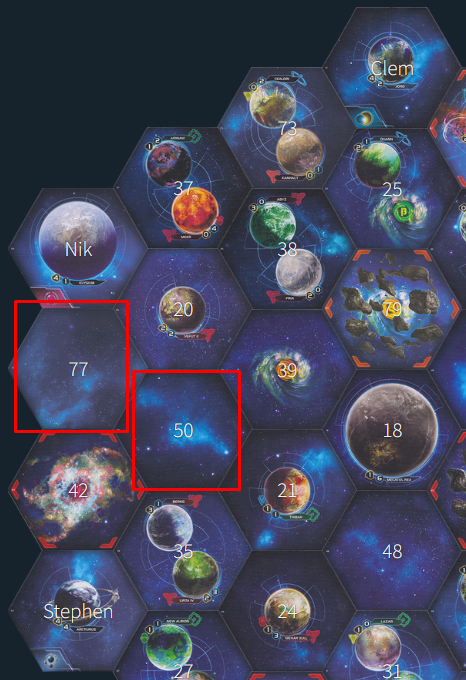
This means that to attack me, Stephen would have to move his fleet across two squares of empty space, providing some extra security. He's heavily incentivized to attack away from me, as he doesn't get any incremental gains from seizing territory on his way to me. In fact, tracing a path from Stephen's home planet to mine only through squares with strategic value is the longest of any position on the map between neighbors.
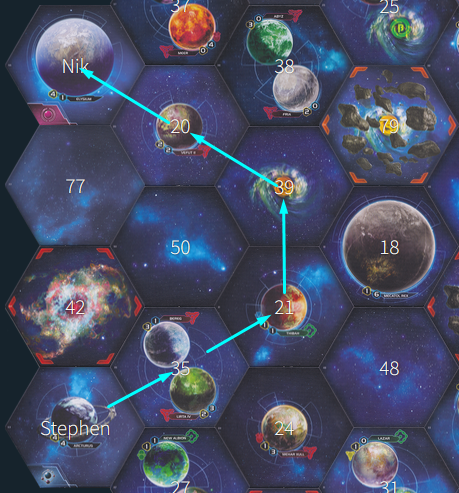
The only reason to move up would be to eliminate me from the game entirely, which no one is going to do to a new player in the early game, on top of it being tactically unsound. I am similarly heavily incentivized to attack upwards, and I can trust that any early weakness in Clem's Federation of Sol setup will be immediately exploited by David on the other side of him, while I don't have to worry as much about Stephen doing the same to me.
IV. Preparation
Next coin, make it to the next coin
You grind or you figure out the exploit
Well, fuck 'em, I'm just comin' for your neck, boy
I don't need to save a thing, I don't need a checkpoint
This mustn't register on an emotional level.
One might argue that studying for a board game is against the spirit of fun, too serious, and even "psychotic". Very fair, but also have fun in the loser's bracket, dweebs!
The first thing to do was ensure that I'm not making trivial mistakes on my first turns, as I would then be left to lament the tragic collapse of my victory chances over the next twelve hours. The rulebook is forty-four pages long, but I do the same thing that I do before studying anything — take a moment to figure out whatever competent practitioners consider to be the best learning resources are2. This leads me to this YouTube video. By the time that the game day rolls around, my understanding is solid.
The next thing I do is learn my own faction abilities, but we'll leave that to last for the purpose of clarity. Here, we'll first quickly assess the relative strength of the factions I'm up against.
The Nomad, Stephen's faction, appears to be mostly based around generating wealth and being able to teleport his flagship around the map. However, teleporting the flagship is limited to a system where he has ground forces, which is great for me because we're separated by empty space. This saves me some study, as it's unlikely that we're going to come to blows.
Clem's Federation of Sol, however, is another matter altogether. During the draft, there's much groaning that the faction is too strong, and a quick assessment of the faction is deeply concerning. For one thing, actions are taken using command tokens, which are essentially the most important resource in the game. Players gain two command tokens per turn.... unless, you're the Federation of Sol, in which case you get an extra one and spawn free troops every turn. This represents a +50% improvement in action economy, which they are then going to use to deep strike human colonizers onto the ancestral homeland of my noble Titans like a thousand ants at my space picnic.
The other factions are not relevant mechanically to the rest of the story, other than noting that David's faction, the Winnu, the ones on the other side of Clem, were extremely sad.
Now we reflect on my own faction. They have a few very strange abilities, but only a handful are relevant. Firstly, when they visit planets, they're able to explore them. Exploration can generate incremental improvements to your planets, but the Titans leave behind tokens that can eventually be transformed into Planetary Defense Systems (PDS), i.e, Giant Space Cannons. This is good for two reasons: firstly, it allows me to incrementally improve my territory without engaging in overt aggression, so fights can break out amongst the rest of the table first. Secondly, the Titans have the strongest PDS in the game, the Hel-Titan.
The initial version of it has this stat card.
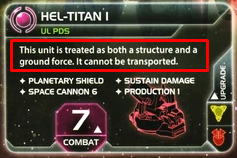
Nothing too crazy, but it does have a special line of text saying that it's both a unit and a structure. I believe this is mostly there because Hel-Titans can fight in ground actions against opposing infantry unlike a normal PDS, which is nice, but is not going to stop the endless hordes of Federation of Sol foot soldiers. I'm going to be in a bad way if I end up relying on that extensively. Nonetheless, file that way for now. Hel-Titans are both ground forces and structures. It's important later.
The upgraded version of the card looks like this3.
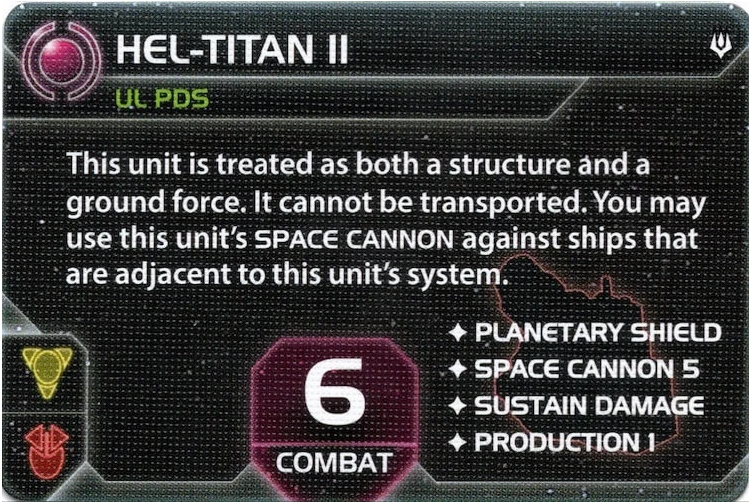
Note that it can fire into adjacent systems, allowing for some offensive usage. This means that I can perform extensive area denial, but I'm still unable to drag the cannons into new positions to support offensives. Plus firing a few shots is hardly a game-changing level of firepower. Nonetheless, I know what my unique advantages are, and they're my Giant Space Cannons.
Of course, the last thing to do is be aware of what can happen in the game. It relies heavily on cards, both to represent technological advances (which are non-random) and to represent hidden victory conditions or political agendas that we will be called on to vote for (which are random). There are approximately fifty pieces of technology, sixty objectives to score, and thirty political agendas.
I do what any reasonable software engineer would do and read them all, taking note of those that interact with Giant Space Cannons. We have a game plan.
V. The First Two Turns
A game of Twilight Imperium IV typically lasts six turns, so the first two turns represent the entirety of the early game.
On the day, I have enough self-respect to admit that I've learned the rules well, but I leave it at that. The first thing I do is simply focus on occupying the planets closest to my home, developing those sectors as aggressively as possible while avoiding coming into direct conflict with Clem's Federation of Sol. Stephen and I leave each other alone. The running joke is that everyone is everyone else's "oldest and most trusted ally" as we try to balance wanting an advantage in resources against not expending ourselves too early in a dubious war.
My goal in this early stage is to score a point or so per turn, which is the community's rough guideline for new players to know if they're doing okay, build space cannons, and beeline for a piece of technology called Hyper Metabolism. All this does is allow me to gain three actions a turn, the thing that the Federation of Sol gets for free, but I knew going in that I would need it to compete. The earlier I get it, the more actions I'm getting over the course of the game.
It is at this point that David blunders. He extends one of his larger spaceships into empty space, where it cannot reasonably pose a threat to anyone. It's really just floating there, alone.
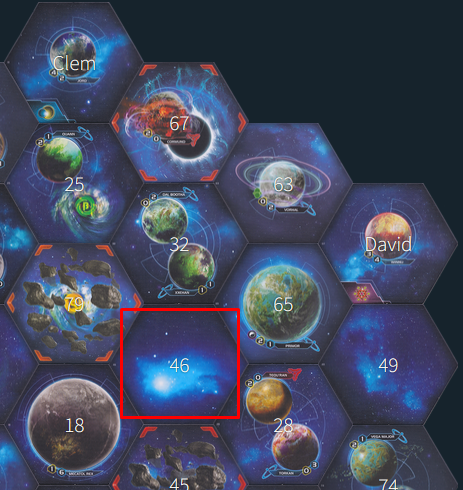
Clem immediately directs the Federation of Sol to ruthlessly crush the ship. Doesn't even think about it for a second on his turn, just picks up the pieces and absolutely fucking rinses4 the poor man, which sets David up for a slow and painful slide out of the competition. I should have paid more attention to how mercilessly Clem executed this move, but I was too busy appreciating that the table was exactly as cutthroat as I had been told, which means that I didn't have to feel bad about what I had planned for later. This almost kills me later.
As we exit the early game, I've successfully beelined for Hyper Metabolism, and now have a solid action economy. I've planted PDS units in these two sectors.
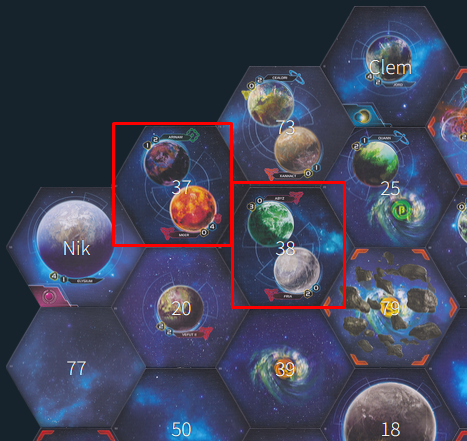
I've also used a few of my more minor powers to assist David's Winnu against Clem's Federation of Sol, both to build relations and to keep a proxy war running against Clem.
VI. Mid-Game
As we enter the third round, there are four players in contention for the win. Stephen has failed to score enough points, and is trailing far behind everyone else despite a reasonably strong fleet and economy. David has mistakenly flown his fleet into a Cormund, a planet next to a black hole so strong that it is ripping his ships apart as they try to leave orbit.
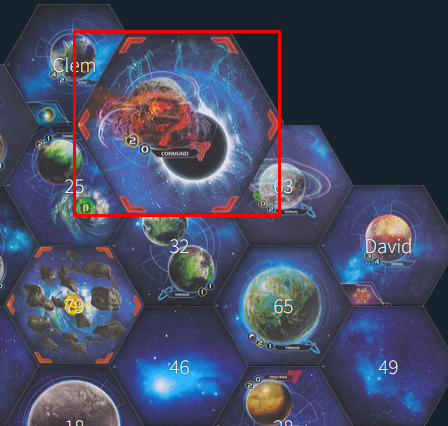
I cannot emphasize enough how much this session sucked for David. His faction was already trash-tier, his fleet is being ripped apart by a black hole, his starting dreadnought is eviscerated in the opening salvo of a war by the combined forces of humanity, and it was all just downhill from there. At one point, David was forced to pitch a single Winnu deep space fighter against a War Sun from Ash's Barony of Letnev. A fighter is an X-wing and a War Sun is a fucking Death Star. Suffice it to say that David has not been having a good time.
Clem is doing well, as the Federation of Sol is grabbing whatever territory it wants from David's Winnu, held back only by a desire not to leave his home systems open to invasion by me.
Ash's Barony has been competing with Brendan's Argent Flight, with the Argent Flight looking like it's slightly ahead, but they're both still in contention. However, they're on the other side of the board and not my problem.
At this point, my play has been quiet. Lots of exploring my own planets and building up some minor improvements. I have four PDS units, which is the maximum allowed, and typically not a very intelligent move. However, I do have a hidden objective to destroy an enemy carrier with a deep space cannon. That's normally hard to do because you have to convince someone to move a carrier into your space, but this is the moment that I activate the first of my two surprise moves.
Clem has stationed some carriers between my foremost planets and his home system... so I upgrade my two foremost PDS units into Hel-Titan II's with the deep space cannon capability I mentioned earlier and light them the fuck up.
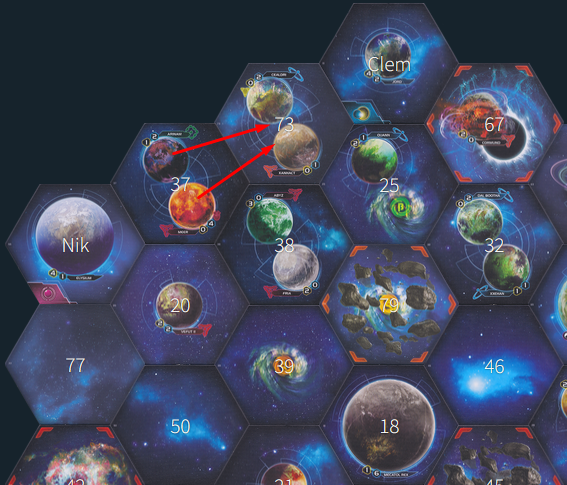
That scores me a quick point, and it is at this point that it becomes apparent that my entire section of the board has become a horrific kill-field. The two frontier sectors of my burgeoning empire have two PDS units each, which exert an absolutely horrendous zone-of-influence. The green box below indicates that due to how they're positioned, they can also fire to support each other against an invasion fleet that attempts to take out the network.
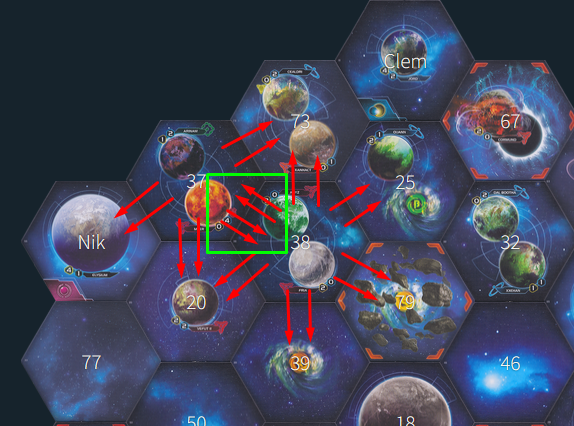
This is backed by a reasonable fleet of powerful Saturn Engine II cruisers, one of the Titans' signature ships, to make matters worse for anyone that wants to try test the borders. It was not quite impenetrable, but anyone that poured sufficient resources into tackling it was going to be easy prey for their other neighbor.
Clem's Federation of Sol had over-extended badly, with a fleet in orbit over Mecatol Rex, so I moved in and grabbed one of his planets. My thinking here was clear. He was in an extremely strong position, controlled Mecatol Rex which yields a respectable number of points, and it was obvious that contesting the land grab would result in the bloodiest turn of the game. The truth is that I am still totally confident that 99% of people would have complained a bit, wallowed, then backed off and looked for a way to lose gracefully.
This is where I almost lost the game.
Remember earlier when I mentioned that I wished I had paid more attention when Clem summarily executed David's helpless dreadnought? Yeah, it turns out that that Clem has ice for blood and is not held back by trivialities like "human frailty" or "hesitation". In a display of terrifying calculation, he thinks for a measly thirty seconds, then takes every unit he has on the map and throws all of them at my frontline, leaving Mecatol Rex undefended. I've never seen someone accept an ugly reality so readily or emotionlessly. I did not realize people could bypass the salt module in their brains and skip straight to retaliation. He throws so many troops at me that they simply absorb the fire from the cannon line, absorb more fire as they drop troops through the stratosphere, then his infantry beat my PDS units (which are probably canonically just big Titans holding railguns) to death. And I'm certain he does this because he just instantly accepted that it was endless bloodshed or lose over the next four turns, and there's no point delaying the amputation.
I'm scared of lawyers now.
I then take all of my troops and launch a counter-offensive. It comes down to a coin flip at the end. By the time the slaughter is over, we both have next to nothing on the board, prompting Stephen to simply remark that we had both "lost a lot of plastic".
VII. Late Game and the Master Plan
I ain't tryna live it like a side quest, yeah
I'm nice enough to kill 'em all with kindness
I been indoors through the winter, yeah
My dick's worth a hundred plus charisma
We break for dinner, having played for around seven hours at this point. Brendan notes that I look too confident, but this is an important part of your civic duty as the villain. If you're going to win, you owe the people the consolation of being as ungracious as possible, so that they have something to rail against before the next session. This also applies to running things like D&D, regardless of what cowards tell you.
This was not obvious to the other players at the table, but at this late stage in the game my economy is fantastically strong. In fact, it's so strong that I realize I can create the maximum allowable number of my ultra-strong cruisers every turn, and they move so fast that I can put them into orbit over Mecatol Rex every turn. The only way for them to realize this is to manually count over all the little numbers of my side of the board, which no one does because they had no reason to until now. So the first thing I do on the next turn is rebuild my entire fleet, rebuild my Hel-Titans, and then activate my master plan.
The way that moving ships and starting combat around is that a player takes a command token, one of those three tokens you get per turn, and put it down on a tile. This is how you decide what tiles things happen in, and when things happen, they all happen. You can move ships into that orbit, build units... and space cannons are allowed to fire. Even if the command token doesn't belong to the player that owns the space cannons.
When I was planning, it flagged for me that building units and firing space cannons are both triggered by the same thing—placing command tokens. Which means, hypothetically, if you were to get deep space cannons next to someone's home world, you would be allowed to fire at their fleet every time they tried to rebuild it. They put the token on, you fire, then they're allowed to build.
Of course, the difficulty is that you can't move PDS units. Even my special Hel-Titans that are units and structures can't be transported, meaning that you can't load them into a carrier and fly them anywhere. It's specifically mentioned on the card, because they knew someone would try some bullshit.

Except there's a piece of technology called Transit Diodes.
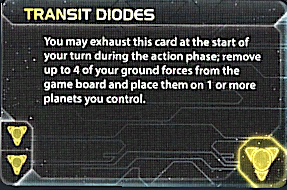
During my early study, the two dying neurons that enable me to write software had fired, and I note that it does not say to transport units. It says to remove ground forces, which my Hel-Titans explicitly are, and place them on a planet. They aren't even the same Hel-Titans, I'm deleting them from memory and then instantiating new ones elsewhere. Transporting has not happened, because that would be illegal. So on Turn 5, I research Transit Diodes and send Clem straight to the fucking Shadow Realm by teleporting my massive gunline adjacent to his home planet. The only escape is into the consolidated remnants of David's Winnu fleet or the black hole planet that eats your ships.
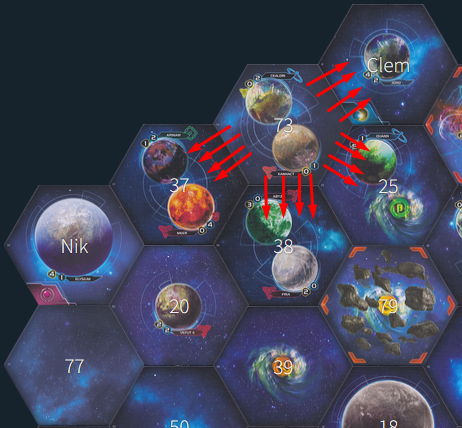
Agent Smith: I'd like to share a revelation that I've had during my time here. It came to me when I tried to classify your species and I realized that you're not actually mammals. Every mammal on this planet instinctively develops a natural equilibrium with the surrounding environment but you humans do not. You move to an area and you multiply and multiply until every natural resource is consumed and the only way you can survive is to spread to another area. There is another organism on this planet that follows the same pattern. Do you know what it is? A virus. Human beings are a disease, a cancer of this planet. You're a plague and we are the cure.
The human threat has been contained. Every turn the Federation of Sol is forced to eat a barrage of four deep space cannon rounds, then another four as I spite-activate his system then neglect to move into it, and another four if his fleet flies anywhere in range of my cannons, and then another four if my cannons are still operational when my inevitable vengeance fleet arrives, and then they have to fight my whole fleet anyway. This is Titan of Ul territory now, and everyone should be grateful because we are benevolent, two thousand feet tall, and I've heard that height is correlated with being an executive. What is the emperor of Mecatol Rex if not the universe's greatest CEO?
VIII. Endgame
We enter the final turn. The first thing that happens is that David's Winnu, as thanks for all the help through the early game fighting off Clem's horde of testosterone-fueled humans, gives me Support for the Throne, a mechanic which gives me one point. Remember this moment the next time you feel that you don't matter.
By now I have the capacity to obliterate any faction on the board in outright war, save from Brendan's Argent Flight, who have been dominating the other side of the board. We win at 10 points, and we're both on 8. You're only allowed to score one public objective per turn (everyone is competing for these), and another secret objective per turn, which is unique to you. You're allowed to buy secret objectives, and I spend my last few resources picking up a new one, because I need one to have a chance at scoring 10 points this round. You win the moment you score the 10th point, and Brendan is before me in the turn order. If I do not win this turn, Brendan will simply score another public objective next round and it's over. He's too far away on the map for me to intervene, and similarly powerful.
Brendan scores his 9th point with a public objective. I wait with bated breath. He does not score his secret objective.
I score a public objective, bringing me my 9th point. Everyone waits to see if they still have a chance at winning.
Remember how I read all the cards, way at the beginning, to understand what my win conditions were? I had done some crude calculations to work out how likely it was I could force one, and the numbers were good. I look down at my secret objective.
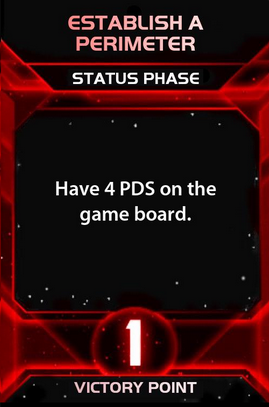
IX.
I told you how it is, I ain't tryna, ah, forget it
Yeah
High score, game over, I don't need another credit5
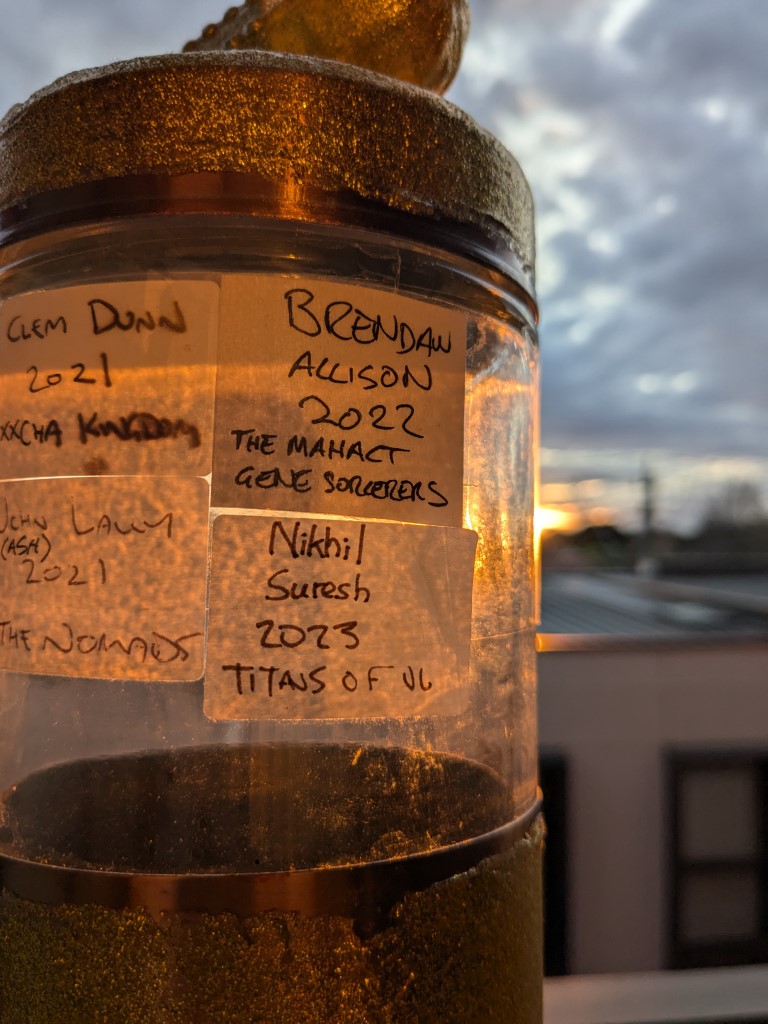
-
I haven't been anonymous for some time, for those who are unaware. ↩
-
Which is probably the greatest meta-learning skill to develop. Even the first image of the map, with a black background behind every name, is only available because I've been cramming Josh Comeau's CSS for JavaScript Developers. I'm not even a web developer, it just always pays off to mainline at least one high-quality resource on ubiquitous technology. ↩
-
The mismatched card sizes are because Stephen owns the board game, so you're unfortunately getting whatever I saved on my computer and whatever shows up on Kagi. ↩
-
Older readers will appreciate that this is how kids say that someone is about to become washed up. ↩
-
But we're playing for the 2024 trophy in September! ↩